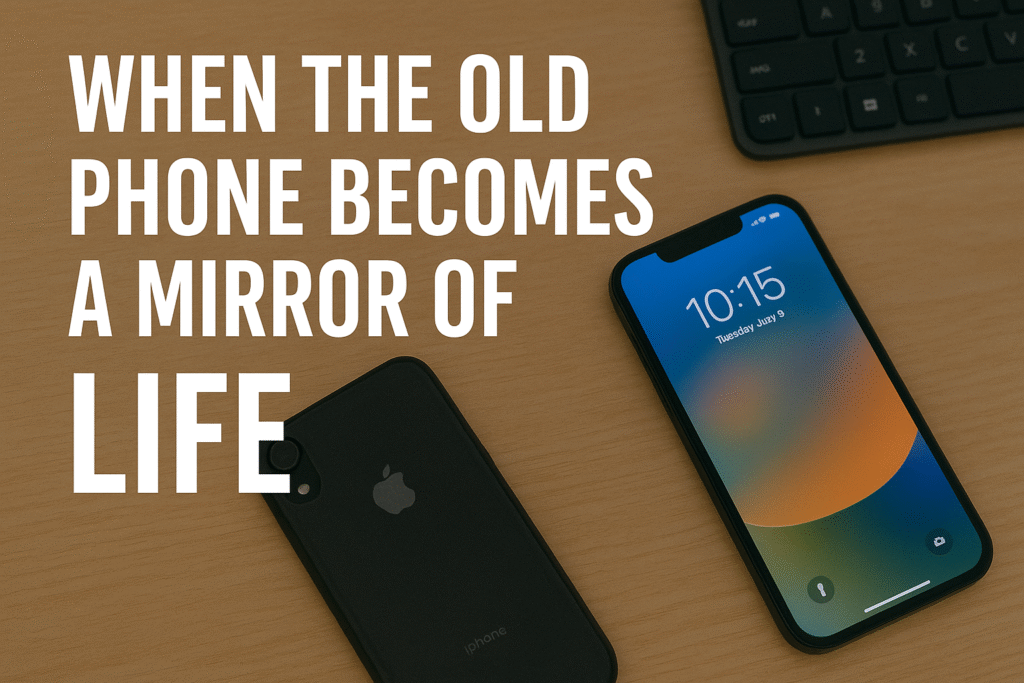It was a regular mid-morning session at the office. I sat at my desk, trying to copy some pictures I had taken earlier at an event. While setting up my PC, I had two phones with me, one on the desk, one in my pocket.
The one on the desk was new, a few days old, a gift, bright, sleek, faster, with more space and a better camera. All the things my old iPhone XR could only dream of.
The one in my pocket? My trusted companion of four years. The one that had been through every early morning and late night with me. It was my reporter’s notepad, my tool for assignments, fieldwork, events, road trips, voice notes, football streams, late-night music and endless chats with friends and loved ones. We had been through cracked screens, low storage warnings and charger replacements, but never once did it fail me.
And yet, as I worked, I realised the new one was shining proudly on the desk while the old one was tucked away, almost forgotten. Waiting, perhaps, for what would befall it. Almost as if it knew what was coming. That tiny act sat heavily with me, because it felt like a conscience-pricking thought rather than one about phones. Why was I already acting like the new one had more value, when the old one had done no wrong? The only problem it ever had was storage and even that, we managed through countless deletions and cloud backups. It had never once given up on me.
Then it hit me, how many times do we do this in life?
In Relationships
We have all seen it or lived it. Someone stays with a partner for years. They build together, share laughter and endure storms. The love may not always sparkle, but it is steady. They may not be perfect, but they have been there through every hard day and quiet night. Then one day, someone new walks in, newer features, fresher energy, maybe more appealing packaging and suddenly, the person who stood by through thick and thin becomes the “old model.”
We start comparing, sometimes (un)consciously. The patience or beauty that once attracted us to them becomes “boring.” The reliability that once brought peace now feels “predictable.” We forget the sacrifices, the silent loyalty, the shared history.
And like my XR, that partner sits quietly in the pocket faithfully, functioning, but no longer favoured. Until one day, we realise that the “new version” might have newer features but not necessarily stronger value. When the dust settles, we see from a place of hindsight that the person who once was everything suddenly becomes a memory, a “used phone” replaced because something newer entered the picture. And when the new one breaks, we realise the old one never did.
At Work
The same happens in workplaces. A long-serving staff member gives their best, shows up early, knows the systems and keeps things moving. Then the organisation decides it is time for “fresh ideas.” New hires arrive, full of energy and trends. The veterans suddenly feel invisible because we put them in the metaphorical pocket.
There again, we forget that these are the people who kept the engine running when things were tough, the ones who built the foundation that the “new” is now standing on. Like my XR, they may not have the latest features, but they carry wisdom, institutional memory, and reliability that no upgrade can replicate. We forget that the systems, values and culture we now enjoy were built by their silent dedication.
It holds true that if we are not careful, our obsession with the new can make us lose the dependable old and by the time we notice, it is gone.
In Friendships
Friendships suffer the same fate. Friends, too, can become like old devices, once useful, once dear, until someone newer, trendier, more connected steps in. Maybe they are more successful, more outgoing, more interesting, and gradually, you drift from the people who once knew your struggles, celebrated your small wins, or held your silence.
We move on and forget that these old friends helped us through storms, encouraged our crazy ideas and held us together when no one else could. We replace depth with excitement, history with novelty. But the truth? Not every “upgrade” adds value. Some just change the wallpaper.
In Life
Our generation has grown used to upgrades, faster, newer and sleeker everything. But the danger is that we have started applying the same mindset to people. We do not fix, we replace. We do not mend, we move on. We do not pause to say thank you before we switch.
And maybe that is why that moment at my boss’s desk got to me. Because it was not about a phone. It was about how quickly we shift our loyalty, how easily we forget the things that once held us together.
But Here’s the Flip Side
While reflecting, I realised the story is not all about sadness. Because the new phone on my desk was not an enemy. I found it to be an opportunity. In fact, I had made plans to purchase a new phone during the second quarter of the year, but had to decide otherwise. So this was a welcome gift, for which I am grateful to the giver. It saves me money and introduces me to new possibilities.
Setting it up gave me insights into how much better serving it could be. It drew my mind to how it represents growth and a step forward. A better camera for sharper images, more storage for future work, and faster performance for upcoming projects. Just like new relationships, new jobs, or new circles, it came with fresh potential and possibilities.
Sometimes, embracing the new is exactly what we need. The old can make us comfortable, but comfort can turn into complacency. New things stretch us for the reason that they challenge us to learn, to adapt and to evolve. A new relationship can awaken parts of us we thought were dormant. A new role can sharpen skills we did not know we had.
Change is not betrayal, so we may be right to take it as part of progress, as long as we move forward with appreciation and not abandonment.
Finding the Balance
So maybe the real lesson that morning was not about phones at all. It was about balance. We must learn to hold gratitude in one hand and growth in the other. To upgrade, yes, but it will serve us better to do it mindfully. To make space for the new, but not at the expense of erasing the old. Because the truth is, both have value. The old gave you roots while the new gives you wings. One grounds you in memory, whereas the other propels you into possibility.
And between them and the dilemma that comes, we can find the wisdom to decipher that it is not everything old that is obsolete and so must be discarded without a thought. Again, not everything new is an improvement. So, as I sit here typing this on my new phone, my XR still hums quietly beside me, not replaced, merely resting. It reminds me of a present world obsessed with upgrades. Such upgrades, I think, should be about learning to value both the stories that brought us here and the possibilities that new things, gadgets, friends, relationships, jobs, etc., could have in store for us.
I do not know how long I will keep it. Perhaps I will gift it someday. But before I do, I will pause and whisper a quiet “thank you” to a device that served me faithfully and without complaint. Because sometimes, gratitude is all that separates appreciation from abandonment.

